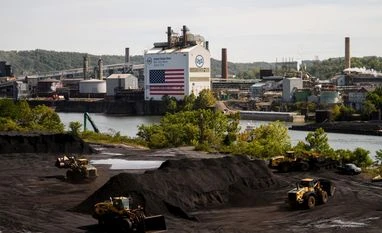Nippon Steel investors weigh costs of $14 bn US Steel acquisition win
The first concern will be financing, necessary to fund both the all-cash acquisition and the promised investments, which range from upgrades to existing plants to a new steel mill
)
The United States Steel Corp. Clairton coke works facility in Pennsylvania. Image: Bloomberg
Listen to This Article
By Stephen Stapczynski and Toshiro Hasegawa
After a year and a half of government talks, countless regulatory hiccups and last-minute negotiations, Nippon Steel Corp. secured its much-wanted prize late last week when President Donald Trump approved the $14.1 billion purchase of United States Steel Corp.
Now the Japanese giant’s shareholders will begin to weigh up the benefits of its biggest ever overseas bet. But they’ll also be keeping a watchful eye on the costs, which include the promise to invest $14 billion over the coming years and significant concessions to the US government that will leave Washington with a say in major decisions and control over some board seats.
Shares of Nippon Steel rose as much as 5 per cent on Monday, the most in over two weeks. They traded 2.3 per cent higher as at 9:35 am Tokyo time.
Also Read
The first concern will be financing, necessary to fund both the all-cash acquisition and the promised investments, which range from upgrades to existing plants to a new steel mill — and how to do that while limiting the dilution of existing shareholders if new equity is issued.
Even before the political complications, the price looked steep. At $55 a share, Nippon Steel is paying a 142 per cent premium to the level US Steel was trading at before it effectively put itself up for sale in 2023. Given US Steel’s “sluggish” earnings, it will now be vital for Nippon Steel to demonstrate early returns on investment, SMBC Nikko analysts said in late-May.
Some investors have already raised concerns. Singapore-based 3D Investment Partners has urged other shareholders in Nippon Steel Corp. to vote against reappointing its president and vice chairman, both of whom have championed a drawn-out US takeover that the fund argues threatens “irreversible” value destruction.
The last-minute victory for Nippon Steel has come against all odds. In January, it faced opposition from the then-president, Joe Biden, and also from Trump, who criticized foreign ownership of an American industrial icon. Last month, however, he began touting the takeover as a “partnership” that will keep US Steel an American company and receive billions in investments.
On Friday, Trump formally opened the door to approving the sale of US Steel by submitting the agreement to the companies and amending Biden’s move to block the agreement in an executive order.
For Nippon Steel, its biggest foreign purchase to date is a bet on a new market for its high-end specialty steel — one that is intended to help the industrial heavyweight diversify away from shrinking demand at home and to help it cope with competition from low-cost Chinese exports.
The deal creates a combined company that will be the world’s second-largest steelmaker. It will become a formidable domestic competitor to Nucor Corp., which for a generation has dominated the American steel industry. The acquisition also clears the way for enhanced steelmaking in areas the US has lagged in recent years, including the type of steel critical to bolster ailing electric grids across the country.
Trump has also hailed the accord as vindication of his trade policies, which have seen the administration inflict tariffs in a bid to pressure companies to shift more manufacturing to the US. Japan has been engaging in negotiations with the US over trade in a bid to avoid higher levies. The president’s decision to champion Nippon Steel’s bid could provide fresh momentum for those talks.
More From This Section
Topics : Nippon Nippon Steel US Steel
Don't miss the most important news and views of the day. Get them on our Telegram channel
First Published: Jun 16 2025 | 8:04 AM IST

